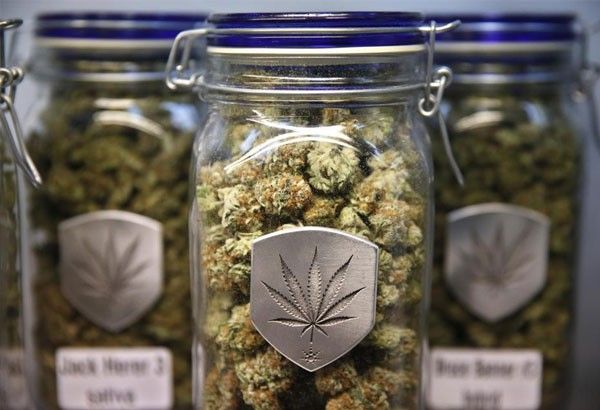
SPEAKER Gloria Macapagal-Arroyo on Tuesday, January 15, said she believes in medical cannabis, and has used cannabis medical patches before.
“I am an author of that [medical marijuana bill]. I really believe in medical cannabis. As you know, I have my problem here and when I’m in a country that allows it, I put a pain patch, but here in the Philippines I cannot do it,” she told reporters Tuesday, January 15, speaking of the chronic pain in her cervical spine.
“So I authored that bill because I believe that it can help me and many other people, but there was a lot of objection to the bill from the House and from the Senate. That’s why we are just letting the legislative process take its course. Right now it’s on second reading,” she added.
President Rodrigo Duterte, who joked about taking marijuana to keep him awake during international summits in December, said he was in favor allowing the use of marijuana not for recreation, but for medicinal purposes — a sentiment supported by 2018 Miss Universe Catriona Gray.
Senate President Vicente Sotto III, for his part, said allowing the use of marijuana for medical purposes is already covered by Republic Act 9165 or the Comprehensive Dangerous Drugs Act of 2002 so there is no need for a new law.
However, the law only allows the use of cannabinoid, the active ingredient in marijuana, for pain reduction. Drugs with cannabinoid, on the other hand, remain unavailable commercially in the Philippines, and can be used only upon the request of health facilities with a physician’s endorsement.
Isabela Rep. Rodolfo Albano III, principal author of the medical marijuana bill, expressed joy over the statements of Arroyo and the President, saying the country’s leaders “have an open mind on the advances of science and research” unlike some medical practitioners.
“Patients with debilitating ailments really need medical cannabis, either for treatment or relief,” he said.
According to him, his proposal would give hope to persons “with debilitating disease, severe pain, intense seizures and persistent muscle spasms” and that most of these patients “are desperate for alternative treatment and have gotten tired of using only pharmaceutical drugs.”
“I feel for all the parents who have spent huge sums of money and are continuing to spend more. You see light at the end of the long, dark tunnel of your children’s suffering and pain,” he said.
He also mentioned that children with frequent medical seizures who were given medical marijuana felt a great improvement in their condition based on research findings.
His bill, as Albino pointed out, seeks to allow the use of medical marijuana under strict regulations to be issued by the Department of Health (DOH) and the Food and Drug Administration.
He urged the critics of his proposal to “shed your fear of the unknown and open your minds to the potential benefits of medical marijuana.”
‘All about money’ — Atienza
Senior Deputy Minority Leader and Buhay party-list Rep. Lito Atienza, meanwhile, accused some of his colleagues of pushing the bill to enrich themselves and not to help people.
“Several lawmakers want to legalize medical marijuana because they themselves are eager to go into the business of cultivating the illegal drug and running dispensaries,” he said.
“Politicians are raring to go into marijuana trade. There are politicians who want to profit from legalized medical marijuana. This is clearly all about money – lots of money,” Atienza added.
Despite Atienza not naming anyone specifically, Albano felt alluded to.
“Atienza’s remark is very un-parliamentarian,” he said.
“He (Atienza) sees ghosts where there are none. He should name names. There is nothing wrong with the medical marijuana bill. Don’t impute ill-motives on the authors. Our only intention is to provide relief to terminally ill patients who are in severe pain,” he added.
Medical cannabis, according to Albano, “has been confirmed to have beneficial and therapeutic uses to treat chronic or debilitating diseases or medical conditions.”
Earlier, presidential spokesperson Salvador Panelo said Duterte would sign into law any bill legalizing medical marijuana, but Atienza said “no such bill would arrive at the Palace for the president to sign.”
“The bill legalizing medical marijuana is already dead as far as this Congress is concerned,” he said.
He added that the House minority prevented further floor deliberation on the measure.
Atienza warned that legalizing marijuana will lead to abuse and addiction and create an unwanted public health emergency in the country.
He insists that the susceptibility to abuse far outweighs any and all of the unproven benefits of allowing prescription marijuana.
“Marijuana is a poison. No amount of sugar-coating will make the illegal drug less toxic,” he said.
The legalization of medical marijuana has also been rejected by the Philippine Medical Association, the professional organization of Filipino physicians.
“It is contrary to the policy of the state to safeguard the wellbeing of its citizenry,” it said.
Along with methamphetamine hydrochloride or shabu, cocaine and heroin, marijuana is tagged as a prohibited substance under the Dangerous Drugs Act of 2002.
Carrying at least 500 grams of marijuana, or at least 10 grams of marijuana concentrate (resin or resin oil), is punishable by life imprisonment plus a fine of up to P10 million under the law. Meanwhile, being in possession of lesser quantities of the drug is punishable by 12 to 20 years in prison plus a fine of up to P500,000.




